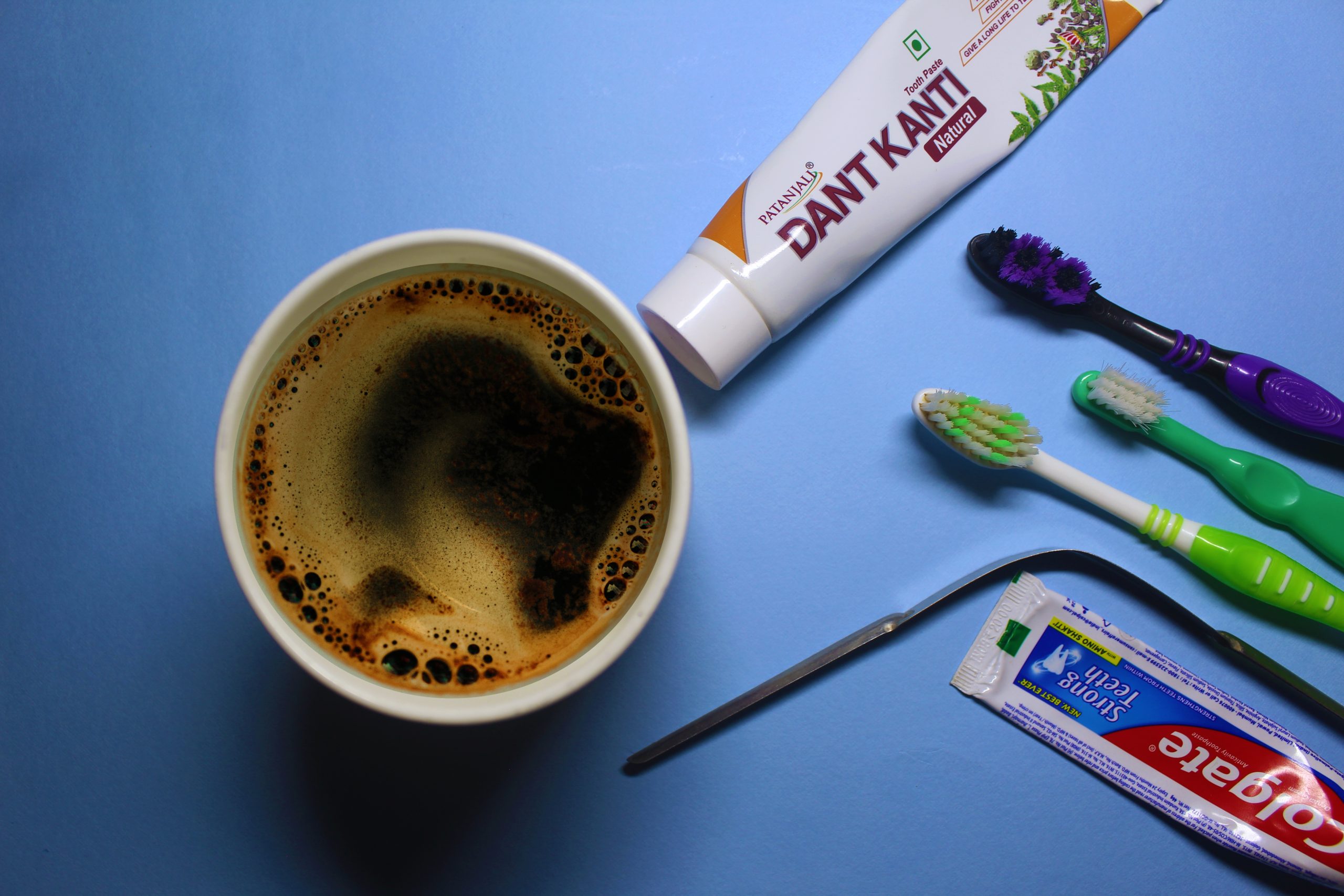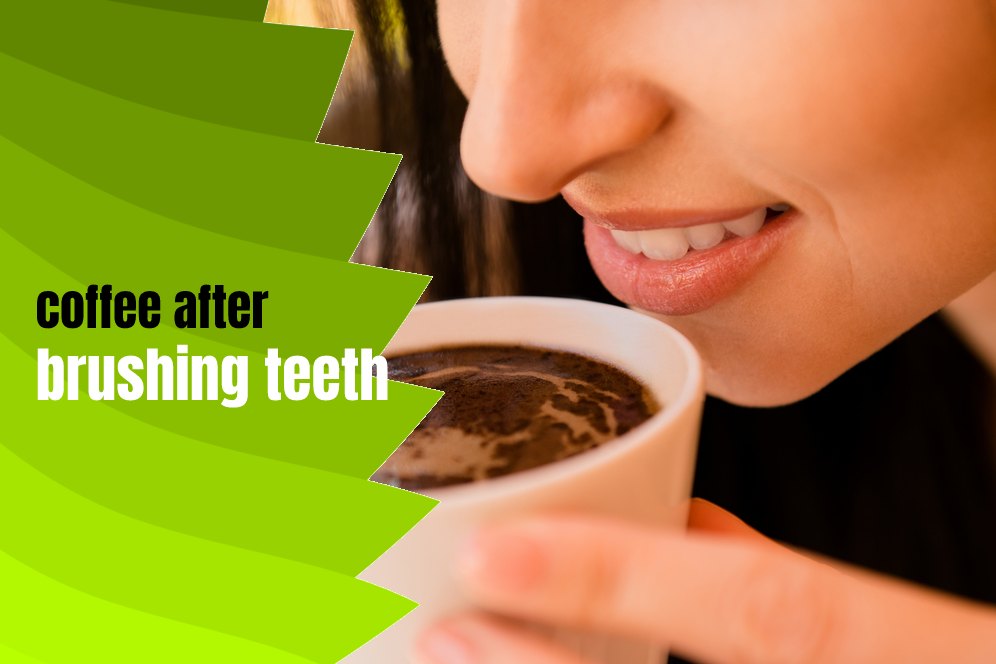Coffee is one of the most beloved beverages worldwide, but it also has a notorious reputation for staining teeth. If you're wondering how long it takes to clean teeth after coffee, you're not alone. This guide will delve into everything you need to know about maintaining oral hygiene after enjoying your favorite cup of coffee.
Many coffee lovers experience concerns about the effects of coffee on their dental health. While coffee can cause stains and discoloration, the good news is that there are effective methods to mitigate these issues. Understanding how long it takes to clean teeth after coffee consumption and adopting proper oral care habits can help preserve your smile.
In this article, we will explore the science behind coffee stains, the recommended timeframes for cleaning teeth post-coffee, and practical tips to keep your teeth white and healthy. Whether you're a casual coffee drinker or a daily enthusiast, this guide will provide you with actionable insights to maintain optimal oral hygiene.
Read also:Nicole Walters Wikipedia The Ultimate Guide To Her Life Career And Achievements
Table of Contents
- The Biology of Coffee Stains
- Recommended Timeframe for Cleaning Teeth After Coffee
- Effects of Coffee on Oral Health
- Best Practices for Cleaning Teeth After Coffee
- Alternative Methods to Prevent Staining
- Common Myths About Coffee and Teeth Stains
- When to Seek Professional Dental Care
- The Science Behind Teeth Whitening
- Long-Term Care for Coffee Drinkers
- Conclusion and Next Steps
The Biology of Coffee Stains
Coffee contains compounds called tannins, which are responsible for its rich flavor but also its staining potential. Tannins are a type of polyphenol that can adhere to the enamel of your teeth, leading to discoloration over time. Enamel, the outer layer of your teeth, is porous, making it susceptible to staining from dark-colored beverages like coffee.
Why does coffee stain teeth? The combination of tannins and acidic properties in coffee creates the perfect environment for staining. Acid weakens enamel, allowing tannins to penetrate deeper into the tooth structure. This process is gradual but can become noticeable with regular coffee consumption.
While brushing immediately after drinking coffee might seem like a solution, it can actually exacerbate the problem. Acidic substances soften enamel temporarily, and aggressive brushing can cause further damage. Understanding the biological process behind coffee stains is the first step in addressing this issue effectively.
Factors Influencing Staining
- Frequency of Coffee Consumption: The more coffee you drink, the higher the risk of staining.
- Oral Hygiene Habits: Poor oral hygiene increases the likelihood of staining and decay.
- Type of Coffee: Darker roasts and stronger brews tend to stain teeth more than lighter varieties.
Recommended Timeframe for Cleaning Teeth After Coffee
One of the most common questions among coffee drinkers is, "How long should I wait to brush my teeth after drinking coffee?" The general recommendation is to wait at least 30 minutes after consuming coffee before brushing. This waiting period allows your enamel to reharden after being exposed to the acidity in coffee.
Why is waiting important? Brushing too soon after drinking coffee can cause enamel abrasion, leading to sensitivity and increased vulnerability to stains. During this 30-minute window, you can take other steps to neutralize the acid, such as rinsing your mouth with water or chewing sugar-free gum.
By adhering to this timeframe, you protect your enamel while ensuring that any residual coffee particles are effectively removed. This simple habit can make a significant difference in maintaining the brightness of your smile.
Read also:Trevor Goddard Movies A Comprehensive Guide To His Filmography And Career
Effects of Coffee on Oral Health
Beyond staining, coffee can have other effects on oral health. The acidity in coffee can contribute to enamel erosion, which increases the risk of cavities and sensitivity. Additionally, coffee can dry out your mouth, reducing saliva production. Saliva plays a crucial role in neutralizing acids and washing away food particles, so a decrease in saliva can lead to oral health issues.
What are the long-term effects? Chronic coffee consumption without proper oral care can result in persistent discoloration, weakened enamel, and even gum disease. However, with the right preventive measures, these risks can be minimized.
Research from the National Institutes of Health highlights the importance of balancing coffee consumption with good oral hygiene practices. By staying informed and proactive, you can enjoy your coffee while safeguarding your dental health.
Short-Term vs. Long-Term Effects
- Short-Term: Temporary discoloration and mild enamel softening.
- Long-Term: Persistent staining, enamel erosion, and increased risk of cavities.
Best Practices for Cleaning Teeth After Coffee
Adopting best practices for cleaning teeth after coffee can significantly reduce the risk of staining and other oral health issues. Here are some effective strategies:
- Rinse with Water: Immediately after drinking coffee, rinse your mouth with water to dilute the acid and tannins.
- Chew Sugar-Free Gum: Chewing gum stimulates saliva production, which helps neutralize acids and clean your teeth naturally.
- Brush Gently: After waiting 30 minutes, use a soft-bristled toothbrush and fluoride toothpaste to clean your teeth thoroughly.
These practices not only address the immediate effects of coffee but also contribute to long-term oral health. Incorporating them into your daily routine can make a noticeable difference in maintaining a bright, healthy smile.
Additional Tips for Coffee Drinkers
- Use a straw to minimize contact between coffee and your teeth.
- Limit the amount of sugar and cream in your coffee to reduce the risk of cavities.
- Visit your dentist regularly for professional cleanings and advice tailored to your needs.
Alternative Methods to Prevent Staining
In addition to traditional oral hygiene practices, there are alternative methods you can use to prevent coffee stains. Natural remedies and preventive measures can complement your daily routine and enhance the effectiveness of your efforts.
Natural Remedies: Some people swear by natural remedies like baking soda and activated charcoal for teeth whitening. While these methods can be effective, it's important to use them cautiously to avoid damaging your enamel. Always consult with your dentist before trying new treatments.
Preventive Measures: Limiting the time your teeth are exposed to coffee can also help. For example, drinking coffee in one sitting rather than sipping throughout the day reduces the duration of acid exposure.
Popular Natural Remedies
- Baking Soda: A mild abrasive that can help remove surface stains.
- Activated Charcoal: Known for its absorbent properties, it can draw out stains from enamel.
- Oil Pulling: An ancient practice involving swishing oil in your mouth to remove toxins and stains.
Common Myths About Coffee and Teeth Stains
There are several misconceptions surrounding coffee and its effects on teeth. Separating fact from fiction is crucial for making informed decisions about your oral health.
Myth 1: Brushing immediately after coffee prevents stains. As discussed earlier, brushing too soon can damage enamel, making it more susceptible to stains.
Myth 2: Adding milk to coffee eliminates staining. While milk can slightly dilute the staining potential of coffee, it doesn't completely prevent it. Coffee with milk still contains tannins that can stain teeth.
Myth 3: Teeth whitening products can completely reverse coffee stains. While whitening products can improve the appearance of stained teeth, they may not address deeper discoloration caused by prolonged coffee consumption.
Separating Fact from Fiction
By understanding the truth about coffee and teeth stains, you can develop a more effective strategy for maintaining oral health. Always rely on credible sources and consult with dental professionals for personalized advice.
When to Seek Professional Dental Care
While at-home care is essential, professional dental care plays a vital role in maintaining optimal oral health. Regular visits to your dentist allow for thorough cleanings and early detection of potential issues.
Signs You Need Professional Help: If you notice persistent staining, increased sensitivity, or other oral health concerns, it's time to schedule an appointment with your dentist. Professional cleanings can remove stubborn stains that brushing alone cannot address.
Professional Whitening Treatments: Dentists offer advanced whitening treatments that are safe and effective. These treatments can provide faster and more noticeable results than over-the-counter products.
Benefits of Professional Cleanings
- Removal of tartar and plaque buildup.
- Identification and treatment of cavities and gum disease.
- Personalized advice for maintaining oral health.
The Science Behind Teeth Whitening
Teeth whitening is a popular solution for coffee stains, but understanding the science behind it can help you make informed choices. Most whitening products use hydrogen peroxide or carbamide peroxide to break down stains on the surface of your teeth.
How Does Whitening Work? Peroxide-based products penetrate enamel and break down stain-causing molecules, leaving your teeth brighter and whiter. However, overuse of these products can lead to enamel damage and sensitivity, so it's important to follow instructions carefully.
Recent studies published in the Elsevier Journal of Dentistry emphasize the importance of balancing whitening treatments with proper oral care to achieve the best results.
Choosing the Right Whitening Product
- Over-the-Counter Options: Whitening toothpaste, strips, and gels for mild staining.
- Professional Treatments: In-office whitening for more severe discoloration.
- Natural Remedies: Baking soda, activated charcoal, and oil pulling for gentle whitening.
Long-Term Care for Coffee Drinkers
For coffee enthusiasts, maintaining long-term oral health requires a combination of consistent care and periodic professional attention. Developing a comprehensive oral hygiene routine can help you enjoy coffee without compromising your smile.
Key Components of Long-Term Care: Brushing twice a day, flossing daily, using mouthwash, and visiting your dentist regularly are the cornerstones of effective oral care. By prioritizing these habits, you can minimize the impact of coffee on your teeth.
Additionally, staying hydrated and consuming a balanced diet can support overall oral health. Foods rich in calcium and vitamin D, such as dairy products and leafy greens, help strengthen enamel and reduce the risk of staining.
Conclusion and Next Steps
In conclusion, understanding how long it takes to clean teeth after coffee and adopting appropriate oral hygiene practices can significantly reduce the risk of staining and other oral health issues. By waiting 30 minutes before brushing, rinsing with water, and using other preventive measures, you can enjoy your coffee while preserving your smile.
We encourage you to take action by implementing the strategies outlined in this guide. Share your thoughts and experiences in the comments below, and don't hesitate to explore other articles on our site for more tips on maintaining optimal oral health.
Remember, your smile is worth the effort. With dedication and consistency, you can enjoy coffee guilt-free and maintain a bright, healthy smile for years to come.


